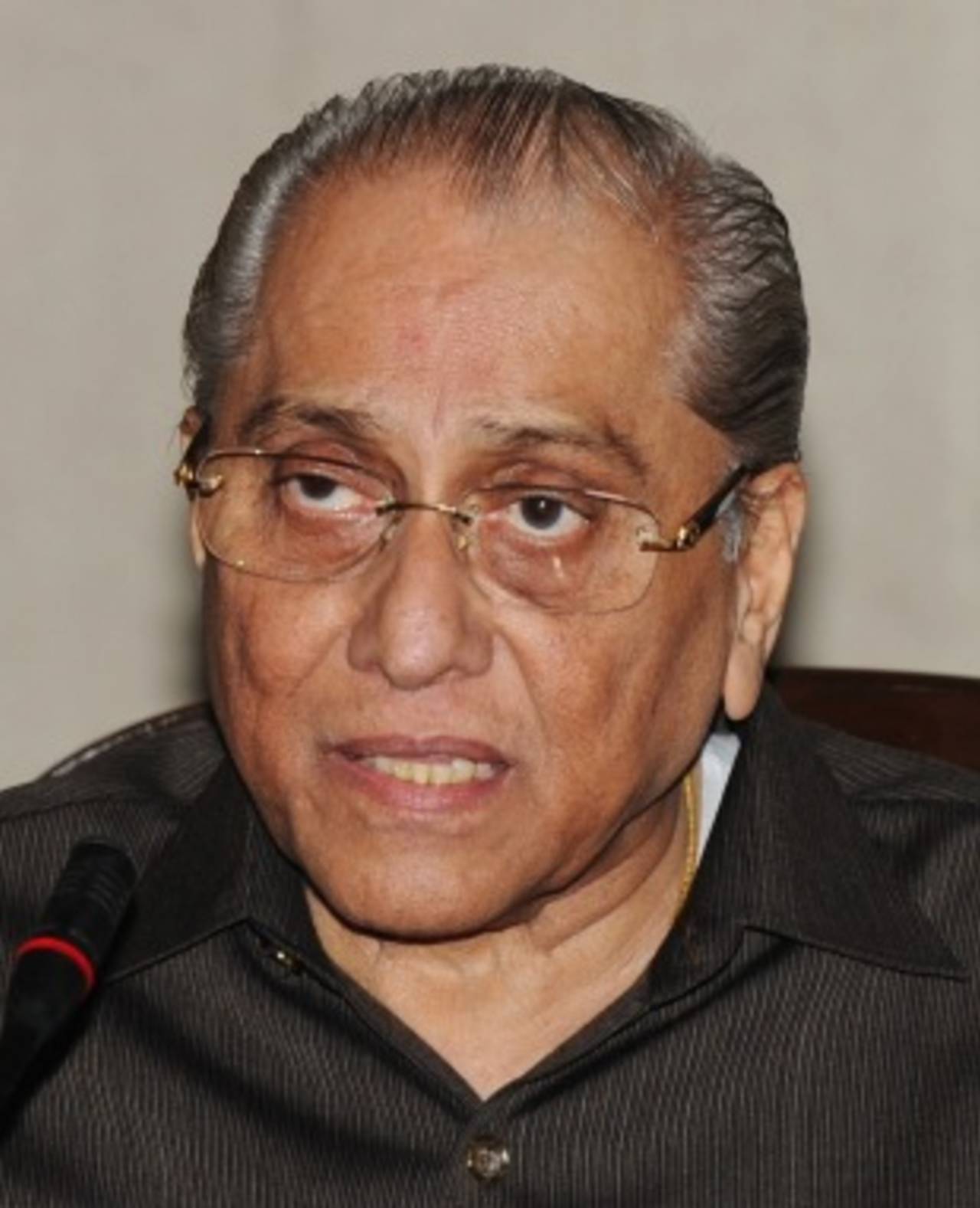BCCI initiates 'operation clean-up'
The BCCI will implement several measures targeted at players, support staff and team owners to curb corruption in the IPL
ESPNcricinfo staff
Jun 10, 2013, 1:07 PM

Jagmohan Dalmiya announced several proposed measures after the working committee meeting • AFP
The BCCI has announced its first set of proposals to "clean up" the IPL, measures ranging from financial disclosures by players and team owners to curbing the tournament's controversial "entertainment" quotient, including putting a stop to cheerleaders and after-match parties.
The measures are part of "operation clean-up," announced by acting BCCI head Jagmohan Dalmiya at the end of a working committee meeting in Delhi on Monday. It aims to curb corruption and remove "sleaze" in the IPL by enforcing a "strict code of conduct" for players, support staff and owners, after the 2013 season was hit by charges of spot-fixing against players and by allegations that team owners were involved in illegal betting.
Players will be required to reveal sources of their earnings, and owners will have to furnish details of payments and their contractual obligations with players and support staff.
Access to the players' dug-out and dressing room has been tightened once again, with Dalmiya saying that team owners will be restricted from these areas during matches. Owners were allowed in the dug-out and dressing room during the first season in 2008, but following complaints had been prevented from entering those areas thereafter. They now have seating arrangements close to the dug-out. Top officials of two teams, Gurunath Meiyappan of the Chennai Super Kings and Raj Kundra of Rajasthan Royals, have confessed to taking part in illegal betting, according to the Mumbai and Delhi police.
Dalmiya also said that "no selector will be allowed to get associated with any franchise in any capacity." No member of India's current selection panel is attached to any franchise, but former selection chairman Kris Srikkanth was brand ambassador for the Super Kings for a period at the start of the IPL.
Players and support staff will need to provide their telephone numbers to the BCCI before the IPL, and there will be a larger number of officials from the BCCI's Anti Corruption and Security Unit at grounds and hotels during the tournament. It was also said that cell phone towers at the ground could be jammed during matches.
No decision was taken on the strategic time-out, which accounts for five minutes of every IPL match and came into being in 2010. The two intervals of two and a half minutes each in every innings allow teams to strategise with support staff, and commercially it creates 300 seconds of advertising space. However, according to police investigations that led to more than 25 betting-related arrests in Delhi and Mumbai, the time-out was also an ideal period for the syndicates to adjust their session and spot odds. When Dalmiya was asked about this, he said: "We have not thought about it, it was just a financial exercise."
On Tuesday, BCCI's secretary Sanjay Patel was quoted in the Indian Express saying that cleaning up the IPL was an "ongoing process" and doing away with the strategic time-outs had "financial implications." He did not rule out any future change, however, saying that the strategic time-out could form a part of "additional measures in our programme. We will discuss all other issues, including strategic time-out in our future meetings."
Operation clean-up is a work in progress, Dalmiya said, and IPL captains will be called for a meeting and franchises will also be consulted before a blueprint could be finalised at another working committee meeting.
By Sharda Ugra
The BCCI's 12-point "Operation Clean-Up" should, in a twisted way, look like a giant leap for Indian cricket. It is the first formal, even if disguised, admission of errors, misdemeanours and lapses in governance that Indian cricket has made since it became the game's financial behemoth.
It was official acknowledgement that the dirt whirling around the IPL could not possibly be brushed under a carpet of delusion. It involved three players, two IPL team owners, the police of two cities, an umpire who was yanked out of the Champions Trophy by the ICC, two dozen illegal bookies and time in prison.
Operation Clean-Up addresses IPL's corruption issues at two levels. Putting an end to cheer leaders and after-match parties and planning to jam cellphones during matches is at worst a cosmetic change, at best tangential. Cheerleaders are not responsible for cricketers being lured by bookies or owners falling prey to gambling. After-match parties have been off limits in the post-Modi IPL world anyway. Jamming cellphones during matches serve no purpose if deals have already been done.
The more serious aspect of the BCCI's plans involve asking cricketers to spell out their financial investments and partnerships, and for IPL owners to come clean with the details of their payment structures with players and support staff. While it may not uncover 'black' or 'grey' money dealings but it is the most you can do. It must be hoped that these will be early steps towards financial transparency in the BCCI, signaling a departure from the IPL's very smelly 'secret tie-break' culture.
Whatever may have been included in the 12-point list, what stayed off it were the unmentionables. Whether BCCI officials would be willing to have their own financial backgrounds so thoroughly examined. To reveal the channels through which they make profits through cricket. Whether the BCCI would consider re-amending their constitution, rolling back the clause that gave N Srinivasan the latitude to buy an IPL franchise. Whether officials fighting misappropriation of funds cases against them could possibly continue in office.
Operation Clean Up is a very small first step. It is the follow through that will tell us whether the BCCI has responded to perhaps the worst crisis in its history with a thorough overhaul of its governance structures, or mere window dressing.